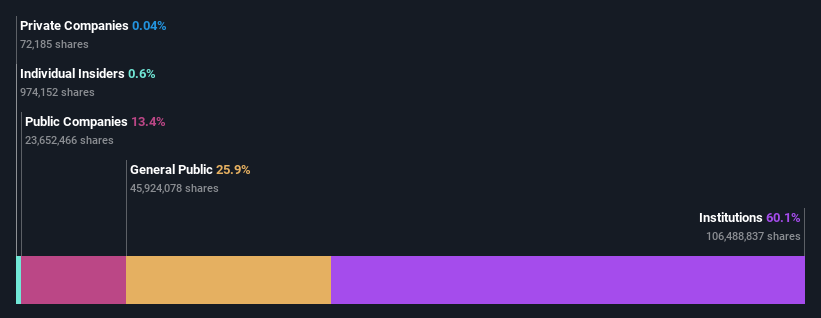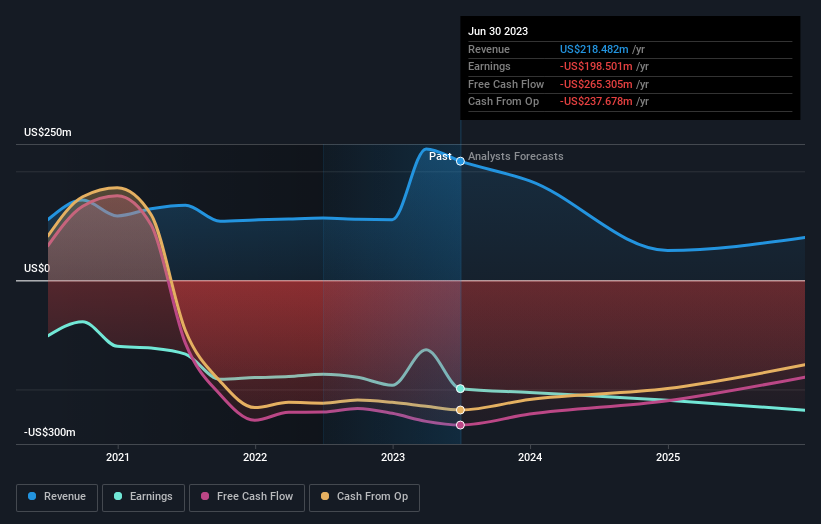Recent uptick might appease Sangamo Therapeutics, Inc. (NASDAQ:SGMO) institutional owners after losing 82% over the past year
Key Insights
Significantly high institutional ownership implies Sangamo Therapeutics' stock price is sensitive to their trading actions
The top 9 shareholders own 51% of the company
Using data from analyst forecasts alongside ownership research, one can better assess the future performance of a company
A look at the shareholders of Sangamo Therapeutics, Inc. (NASDAQ:SGMO) can tell us which group is most powerful. We can see that institutions own the lion's share in the company with 60% ownership. That is, the group stands to benefit the most if the stock rises (or lose the most if there is a downturn).
After a year of 82% losses, last week’s 18% gain would be welcomed by institutional investors as a likely sign that returns might start trending higher.
Let's delve deeper into each type of owner of Sangamo Therapeutics, beginning with the chart below.
Check out our latest analysis for Sangamo Therapeutics
What Does The Institutional Ownership Tell Us About Sangamo Therapeutics?
Institutional investors commonly compare their own returns to the returns of a commonly followed index. So they generally do consider buying larger companies that are included in the relevant benchmark index.
Sangamo Therapeutics already has institutions on the share registry. Indeed, they own a respectable stake in the company. This suggests some credibility amongst professional investors. But we can't rely on that fact alone since institutions make bad investments sometimes, just like everyone does. It is not uncommon to see a big share price drop if two large institutional investors try to sell out of a stock at the same time. So it is worth checking the past earnings trajectory of Sangamo Therapeutics, (below). Of course, keep in mind that there are other factors to consider, too.
Investors should note that institutions actually own more than half the company, so they can collectively wield significant power. Sangamo Therapeutics is not owned by hedge funds. Biogen Inc. is currently the largest shareholder, with 13% of shares outstanding. With 9.6% and 9.0% of the shares outstanding respectively, Wasatch Advisors LP and BlackRock, Inc. are the second and third largest shareholders.
We did some more digging and found that 9 of the top shareholders account for roughly 51% of the register, implying that along with larger shareholders, there are a few smaller shareholders, thereby balancing out each others interests somewhat.
Researching institutional ownership is a good way to gauge and filter a stock's expected performance. The same can be achieved by studying analyst sentiments. There are a reasonable number of analysts covering the stock, so it might be useful to find out their aggregate view on the future.
Insider Ownership Of Sangamo Therapeutics
The definition of an insider can differ slightly between different countries, but members of the board of directors always count. Management ultimately answers to the board. However, it is not uncommon for managers to be executive board members, especially if they are a founder or the CEO.
Insider ownership is positive when it signals leadership are thinking like the true owners of the company. However, high insider ownership can also give immense power to a small group within the company. This can be negative in some circumstances.
Our most recent data indicates that insiders own less than 1% of Sangamo Therapeutics, Inc.. It appears that the board holds about US$957k worth of stock. This compares to a market capitalization of US$174m. Many tend to prefer to see a board with bigger shareholdings. A good next step might be to take a look at this free summary of insider buying and selling.
General Public Ownership
The general public-- including retail investors -- own 26% stake in the company, and hence can't easily be ignored. This size of ownership, while considerable, may not be enough to change company policy if the decision is not in sync with other large shareholders.
Public Company Ownership
Public companies currently own 13% of Sangamo Therapeutics stock. This may be a strategic interest and the two companies may have related business interests. It could be that they have de-merged. This holding is probably worth investigating further.
Next Steps:
It's always worth thinking about the different groups who own shares in a company. But to understand Sangamo Therapeutics better, we need to consider many other factors. Consider for instance, the ever-present spectre of investment risk. We've identified 4 warning signs with Sangamo Therapeutics (at least 1 which is a bit unpleasant) , and understanding them should be part of your investment process.
Ultimately the future is most important. You can access this free report on analyst forecasts for the company.
NB: Figures in this article are calculated using data from the last twelve months, which refer to the 12-month period ending on the last date of the month the financial statement is dated. This may not be consistent with full year annual report figures.
Have feedback on this article? Concerned about the content? Get in touch with us directly. Alternatively, email editorial-team (at) simplywallst.com.
This article by Simply Wall St is general in nature. We provide commentary based on historical data and analyst forecasts only using an unbiased methodology and our articles are not intended to be financial advice. It does not constitute a recommendation to buy or sell any stock, and does not take account of your objectives, or your financial situation. We aim to bring you long-term focused analysis driven by fundamental data. Note that our analysis may not factor in the latest price-sensitive company announcements or qualitative material. Simply Wall St has no position in any stocks mentioned.


